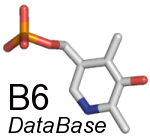|
|
| type |
Journal Article |
| authors |
Zhou, H.; Huxtable, S.; Xin, H.; Li, N. |
| title |
Enhanced high-level expression of soluble 1-aminocyclopropane-1-carboxylase synthase and rapid purification by expanded-bed adsorption |
| journal |
Protein Expr Purif |
| Activity |
4.4.1.14 |
| Family |
4.4.1.14 |
| ui |
Elesacs |
| year |
(1998) |
| volume |
14 |
| number |
2 |
| pages |
178-84 |
| | |
|---|
| keywords |
Chromatography/methods |
| abstract |
1-Aminocyclopropane-1-carboxylate (ACC) synthase is a key enzyme regulating the biosynthesis of the plant hormone ethylene. Expression of ACC synthase in Escherichia coli can result in the production of a large proportion of the enzyme in the form of insoluble aggregates (inclusion bodies). We investigated the effect on the soluble expression in E. coli of tomato and zucchini ACC synthases, by manipulation of the induction conditions, changing the vector, and deletions in the amino acid sequence. Manipulation of the induction conditions did not influence the soluble expression; however, soluble expression increased significantly when the enzyme was cloned into vector pET11d, in comparison to the other vector used, pET30a. It was also found that when ACC synthase with a portion of the C-terminus deleted was inserted into pET11d, the soluble expression was further enhanced in comparison to that of the full length. Structural and functional analysis of ACC synthase requires the purification of milligram quantities of protein to homogeneity. The development of a faster and simpler protocol for the purification of ACC synthase is highly desirable due to the extreme lability of the enzyme. C-terminal truncated tomato ACC synthase was overexpressed in E. coli pET11d and purified by expanded-bed adsorption and hydroxylapatite FPLC. This improved two-step purification protocol allows for rapid, high-level purification with a significantly improved yield in comparison to the multistage purification it replaces. 15.7 mg of highly purified tomato ACC synthase del-1 were obtained from 2 L of cells in comparison to 2 mg from 10 L using a multistage purification. This represents a 40-fold improvement in yield. Antibodies were raised against C-terminal deleted ACC synthase. The antibodies were purified by epitope-specific affinity chromatography and used to assess the identity and purity of the C-terminal-deleted tomato ACC synthase purified by expanded-bed adsorption. |
| last changed |
2008/04/25 17:36 |
|











